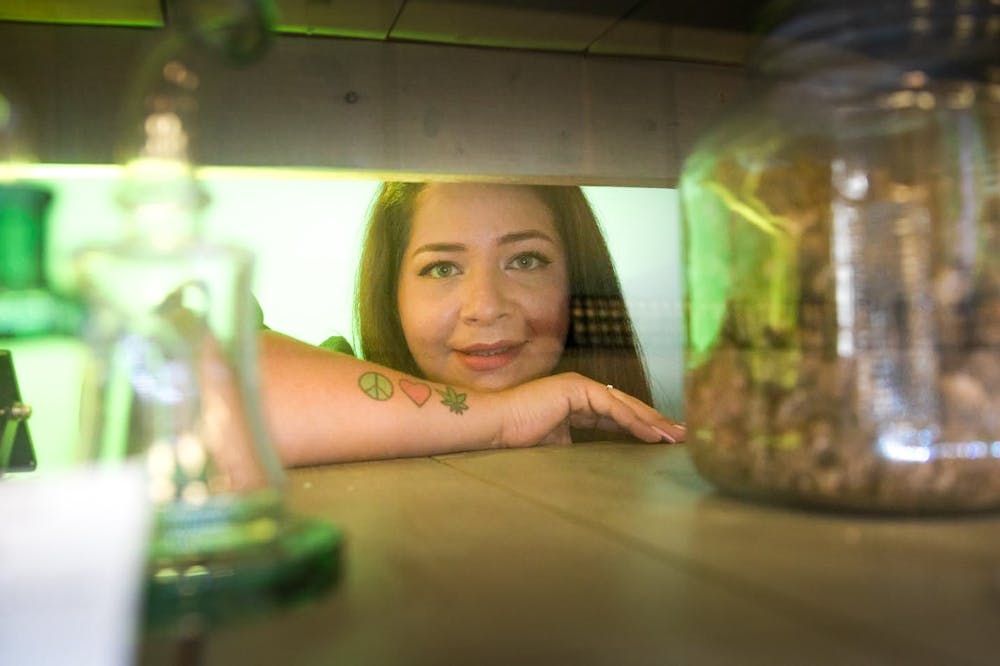“It’s changed so many people’s lives, which I think is the main thing that keeps me going,” she said. “Having customers come in and say, ‘This literally changed my life for the better,’ is amazing.”
Racial disparities in marijuana arrests
Despite Durand's positive experiences with cannabis products, widespread racial disparities in drug policing still exist across North Carolina.
North Carolina is among the 32 states where marijuana is not fully legal. It was one of the first states to decriminalize low amounts of marijuana possession in 1977.
Possessing up to half an ounce of marijuana is punishable by a fine of up to $200, and possessing half an ounce to an ounce and a half is punishable by up to 45 days in jail and a $1,000 fine. Possession of any higher amount is a felony, which could carry a sentence of three to eight months of incarceration.
Currently in North Carolina, hemp products, like CBD and Delta-8 THC, are legal, but more potent cannabis products, like marijuana, are illegal.
Right now, Senate Bill 711, or the Compassionate Care Act, is under consideration in the North Carolina General Assembly. The bill would make marijuana for medical use legal in the state.
The bill — introduced last April — has since been stalled after being referred to the Committee on Rules and Operations of the Senate in August.
Nearly 30,000 people were arrested for drug possession in North Carolina in 2020, with 12,307 of those arrests being for marijuana possession, according to the FBI’s Crime Data Explorer.
Of those 2020 marijuana possession arrests, 58 percent were of Black people. In Raleigh, that number jumps to 77 percent, and in Durham, 87 percent of those arrested for marijuana possession were Black, according to federal data.
Additionally, according to the North Carolina Task Force for Racial Equity in Criminal Justice, which was established by Gov. Roy Cooper in June 2020, 63 percent of convictions for misdemeanor marijuana possession in 2019 were of people of color.
In November 2020, the task force recommended the decriminalization of marijuana possession and further discussion on full legalization in the state.
To get the day's news and headlines in your inbox each morning, sign up for our email newsletters.
“You cannot talk about improving racial equity in our criminal justice system without talking about marijuana,” North Carolina Attorney General Josh Stein said in a press release about the recommendations. “White and Black North Carolinians use marijuana at similar rates, yet Black people are disproportionately arrested and sentenced.”
Local initiatives
For the Chapel Hill and Carrboro police departments, there were 33 total marijuana possession arrests, according to federal data. Of those arrested in Chapel Hill and Carrboro, 20 were Black.
Orange County Criminal Justice Resource Director Caitlin Fenhagen said making marijuana possession a low priority among law enforcement and implementing pre-arrest diversion programs for other substance use issues have been the main reasons for the low number of charges.
“We can’t arrest our way out of substance use issues,” Fenhagen said. “We know it’s not helpful to put somebody in our detention center, incarcerate them for a substance use issue. It only exacerbates the issue.”
Macon Hollister, the recovery diversion coordinator in the Orange County Criminal Justice Resource Department, said she believes partnerships with local law enforcement and programs the department runs have helped to minimize drug possession arrests.
“The positive partnerships and relationships that we’ve been able to build as a community have been able to mitigate some of those arrests,” Hollister said.
The Lantern Project, which is run by the department, helps previous justice-involved individuals to manage substance use disorders through pre-arrest diversion and reentry assistance.
While such programs and reducing the priority of marijuana possession have made positive impacts, Fenhagen said the next step should be decriminalization.
“There’s a lot of good conversation about decriminalizing marijuana possession,” she said. “Deprioritizing is one thing, and we certainly see that in Orange County with our law enforcement agencies, but deprioritizing is not the same as ending it.”
Durand said she believes full marijuana legalization — for medical and recreational use — would be the best step forward for addressing racial disparities in drug policing.
“Once people realize that it’s not a horrible drug that ruins people’s lives, I hope that will make law enforcement realize, or not have the option or the availability to, arrest minorities at such a disproportionate rate,” Durand said.
@ethanehorton1
@DTHCityState | city@dailytarheel.com | elevate@dailytarheel.com
Ethan E. HortonEthan E. Horton was the 2023-24 city & state editor at The Daily Tar Heel. He previously served as a city & state assistant editor and as the 2023 summer managing editor.




